Theologians on the Christian Life Series (8 vols.)
Digital Logos Edition
Overview
Crossway’s latest books in their Theologians on the Christian Life (4 vols.) series tackles some of Christianity’s towering personalities from the early to the modern church. From Augustine to Luther to Packer, these figures come to life as never before through refined research and careful synthesis. More than mere biographies, these volumes take you into the minds and hearts of their subjects in order to help you see through their eyes how they envisioned the heart of the Christian life. Equal parts scholarly and spiritual, this set culls these great Christian minds for pearls of biblically based wisdom that is as relevant today as ever before.
Complete the series with Theologians on the Christian Life (4 vols.).

Key Features
- Appeals to Christianity’s leading theologians for insight into the Christian life
- Provides penetrating syntheses of the major thoughts of these preeminent theologians
- Helps make these figures accessible and relevant to a contemporary audience
Product Details
- Title: Theologians on the Christian Life Series
- Editors: Stephen J. Nichols and Justin Taylor
- Series: Theologians on the Christian Life
- Publisher: Crossway
- Volumes: 8
- Pages: 2,024
- Resource Type: Biographies
- Topic: Church History
Individual Titles
- Augustine on the Christian Life: Transformed by the Power of God by Gerald Bray
- Bavinck on the Christian Life: Following Jesus in Faithful Service by John Bolt
- Calvin on the Christian Life: Glorifying and Enjoying God Forever by Michael Horton
- Edwards on the Christian Life: Alive to the Beauty of God by Dane C. Ortlund
- Luther on the Christian Life: Cross and Freedom by Carl R. Trueman
- Newton on the Christian Life: To Live Is Christ by Tony Reinke
- Owen on the Christian Life: Living for the Glory of God in Christ by Matthew Barrett and Michael A. G. Haykin
- Packer on the Christian Life: Knowing God in Christ, Walking by the Spirit by Sam Storms
This title is included in the following collections
You can save when you purchase this product as part of a collection.
Theologians on the Christian L...
$255.84$229.99
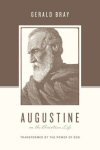
Augustine is widely considered to be the most influential theologian in church history after the apostle Paul. Dramatically converted from a life of licentiousness to one of wholehearted devotion to Christ, the humble North African pastor quickly established himself as a leading figure within the ancient church. In Augustine on the Christian Life, historian Gerald Bray explores the rich spirituality of this extraordinary man, examining his historical context, approach to the Christian life, and work as a preacher and teacher of God’s Word. Drawing on Augustine’s many writings—including his classic spiritual autobiography, the Confessions—Bray demonstrates Augustine’s enduring relevance for Christians today.
Gerald Bray accomplishes an improbable task with this remarkable book on Augustine’s view of the Christian life. Bray surveys the voluminous and brilliant contributions from the bishop of Hippo and presents them in a readable and understandable manner. In doing so, he provides us with an edifying, informative, and helpful resource for students, historians, theologians, and church leaders alike. It is a joyful privilege to recommend this excellent addition to Crossway’s Theologians on the Christian Life series.
—David S. Dockery, president, Trinity International University
Gerald Bray gives us a richly informative and richly edifying introduction to Augustine and his teaching on the Christian life. It will enable those who have read very little of Augustine, as well as those much more familiar with him, to see Augustine as he would have wanted to be seen: a sinner saved by grace seeking to teach faithfully what he found in the Scriptures. Augustine’s specific devotional teaching is placed in the context of his mammoth contribution to Christian theology and Western civilization more generally. The accessibility of this introduction belies the depth of scholarship, which becomes evident in the footnotes and bibliography. Here is a sure-footed guide to the thinking of one of the greatest minds in the history of the Christian church.
—Mark D. Thompson, principal, Moore Theological College
Augustine told us that only God can be enjoyed for his own sake; all others must be considered as they relate to God. How fitting that Gerald Bray leads us to consider Augustine not for his own sake, but as a gateway to a vision of the one true God and the life lived more deeply in his triune presence. With a teacher’s wisdom and a scholar’s facility with the primary texts, Bray helps guide readers more deeply into the Christian life through the great bishop’s interaction with a host of challenges—real, cruel threats to Christian faithfulness—ranging from the Manichaeans to the Donatists and the Pelagians. Take up and read, and let Bray take you to school.
—Michael Allen, associate professor of systematic and historical theology, Reformed Theological Seminary
Gerald L. Bray is research professor of divinity, history, and doctrine at Beeson Divinity School in Birmingham, Alabama, and distinguished professor of historical theology at Knox Theological Seminary in Fort Lauderdale, Florida. Dr. Bray is the editor of the Anglican journal Churchman and has published a number of books, including the award-winning Biblical Interpretation: Past and Present, Yours Is the Kingdom: A Systematic Theology of the Lord’s Prayer, God Is Love: A Biblical and Systematic Theology, and God Has Spoken: A History of Christian Theology.
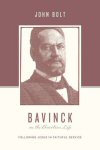
Herman Bavinck looms large as one of the nineteenth century’s greatest Christian thinkers, contributing much to modern Reformed theology. Yet, despite his theological prowess, Bavinck was first and foremost concerned with being “a worthy follower of Jesus.” In this book, John Bolt—editor of the English edition of Bavinck’s four-volume masterpiece, Reformed Dogmatics—brings the great Dutch theologian’s life and work to bear on following Jesus in the twenty-first century, helping us see the direct connection between robust theology, practical holiness, and personal joy.
To use the word timely for a book about a nineteenth-century Dutch theologian may seem inappropriate. But in this case the adjective is exactly right. Many of us have wanted to spread the word that Herman Bavinck’s theological perspective can contribute much to a renewal of the church’s life and mission today. Now in this book John Bolt has made the case in a concise and convincing manner!
—Richard J. Mouw, president and professor of Christian philosophy, Fuller Theological Seminary
This obvious labor of love explores an important but insufficiently highlighted aspect of Bavinck’s thought. Leaving virtually no pertinent stone unturned throughout his life and published works, Bolt provides both a full presentation of Bavinck’s views and his own understanding of their continuing relevance for Christian discipleship today. Here is valuable instruction in Bavinck’s thought presented in a way that will also stimulate the reader’s own thinking on the issues raised.
—Richard B. Gaffin Jr., professor of biblical and systematic theology, emeritus, Westminster Theological Seminary
Trinitarian, Christ-centered, and culturally engaged, Herman Bavinck immerses us into a vivid vision of the gospel of Jesus Christ. His rich theological imagination provides a compelling alternative to the many vapid, pragmatic approaches to faith today. John Bolt provides an accessible and illuminating guide to Bavinck’s theology of the Christian life in the most expansive sense: the Christian life of fellowship with God and others, in family, work, and politics. Bolt skillfully navigates these waters in order to open up the treasures of Bavinck for today’s church.
—Todd Billings, research professor of Reformed theology, Western Theological Seminary
John Bolt is professor of systematic theology at Calvin Theological Seminary in Grand Rapids, Michigan. He is the author of several books and the editor of the four-volume English edition of Herman Bavinck’s Reformed Dogmatics (4 vols.).
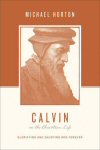
John Calvin, a man adored by some and maligned by others, stands as a legendary figure in Christian history. In Calvin on the Christian Life, professor Michael Horton offers us fresh insights into the Reformer’s personal piety and practical theology by allowing Calvin to speak in his own words.
Drawing not only from his Institutes and biblical commentaries, but also from lesser-known tracts, treatises, and letters, this book will deepen your understanding of Calvin’s theology and ministry by exploring the heart of his spiritual life: confident trust and unwavering joy in the sovereign grace of God.
Be warned. This looks like a book on how Calvin thought about living the Christian life. But open it and you will discover that Mike Horton is driving you on a grand Calvin tour of the whole of theology. And that, of course, is Professor Horton’s (and John Calvin’s) point: it takes the whole biblical gospel to make a whole Christian life. By employing the classical formulation of the two natures of Christ (‘distinct but not separate’), Dr. Horton provides readers with a key to help unlock Calvin’s teaching. But more than that, he shows why the Genevan Reformer’s vision of the Christian life remains unsurpassed. Thoroughly satisfying, thoroughly enjoyable, and thoroughly recommended.
—Sinclair B. Ferguson, professor of systematic theology, Redeemer Seminary
Learned and lucid, masterfully organized, and vigorously expressed, this full, solid, and exact study of Geneva’s reforming pastor is an outstanding piece of work. In all four sections Calvin comes to vigorous life. Calvin’s reputation for godly wisdom, and Horton’s for vivid writing, will certainly be enhanced.
—J. I. Packer, professor of theology, Regent College
Scholar and pastor Michael Horton has provided us with a well-researched introduction to John Calvin’s doctrine of piety—Calvin’s word for the reverence and love that the gospel produces in all our relationships. One of the most intriguing aspects of Horton’s book is the way he traces the theme of ‘distinction without separation’ through the Christian life, whether with respect to the two natures of Christ, grace and the sacraments, or church and state. This book will enlighten beginners and refresh and challenge veterans in the field.
—Joel R. Beeke, president, Puritan Reformed Theological Seminary
Michael S. Horton is the J. Gresham Machen Professor of Systematic Theology and Apologetics at Westminster Seminary California. A Reformed minister, he also co-hosts the White Horse Inn and is editor of Modern Reformation magazine. Horton has authored more than 20 books, including The Christian Faith: A Systematic Theology for Pilgrims on the Way, Introducing Covenant Theology, and Christ the Lord: The Reformation and Lordship Salvation.
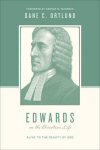
Jonathan Edwards is widely hailed as the greatest theologian in American history. In Edwards on the Christian Life, Dane Ortlund invites us to explore the great eighteenth century pastor’s central passion: God’s resplendent beauty. Whether the topic was the nature of love, the preeminence of Scripture, or the glory of the natural world, the concept of beauty stood at the heart of Edwards’s theology and permeated his portrait of the Christian life. Clear and engaging, this accessible volume will inspire you to embrace Edwards’s magnificent vision of what it means to be a Christian: enjoying and reflecting on the beauty of God in all things.
In his theological concern for the beautiful and the beauty of God, Jonathan Edwards stands at the end of a long theological tradition that reaches back to Augustine and beyond, even to the Scriptures themselves. In the last two centuries, however, this area of theological inquiry seems to have dropped off the radar for Christian theologians and practitioners, which may explain why students of Edwards’s corpus of writings have not tackled the subject. Ortlund’s study nicely fills this lacuna, for he rightly shows, from a multitude of angles, that beauty is the fulcrum of Edwards’s thinking. A joy to read and to ponder!
—Michael A.G. Haykin, professor of church history and biblical spirituality, The Southern Baptist Theological Seminary
Jonathan Edwards is widely known as a hellfire-and-brimstone preacher. Serious students, like Dane Ortlund, have long known he was much more. In this book Ortlund puts his careful research to good purpose as he demonstrates convincingly that the center of Edwards’s concern was always and supremely beauty—in God, from God, and for God. Grateful readers will find this book highly informative on Edwards and deeply encouraging for the Christian life today.
—Mark A. Noll, professor of history, University of Notre Dame
No one has taught me more about the dynamics of Christian living than has Jonathan Edwards. And no one has more clearly articulated the role of beauty in Edwards’s understanding of the Christian life than has Dane Ortlund. If you’re unfamiliar with Edwards, or if you wonder how beauty could possibly have any lasting effect in your growth as a Christian, this book is for you.
—Sam Storms, senior pastor, Bridgeway Church, Oklahoma City, Oklahoma
Dane C. Ortlund (PhD, Wheaton College) is senior vice president for Bible publishing at Crossway. He serves as an editor for the Knowing the Bible Series (12 vols.) series and the Short Studies in Biblical Theology series, and is the author of several of books, including Mark: A 12-Week Study.
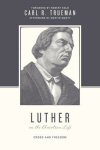
Martin Luther’s historical significance can hardly be overstated. Known as the father of the Protestant Reformation, Luther has had an enormous impact on Western Christianity and culture. In Luther on the Christian Life, historian Carl Trueman introduces readers to the lively reformer, taking them on a tour of his historical context, theological system, and approach to the Christian life. Whether exploring Luther’s theology of protest, ever-present sense of humor, or misunderstood view of sanctification, this book will help modern readers go deeper in their spiritual walk by learning from one of the great teachers of the faith.
If you think you know Luther, read this book. It is a remarkably edifying and illuminating piece of work. Displaying the interests of a pastor and the rigor of a historian, Carl Trueman provides us with an analysis of Luther on the Christian life that is as ‘human’ as the German Reformer himself. Yet it’s far more than Luther on the Christian life. It’s one of the very best summaries of Luther in context.
—Michael Horton, professor of systematic theology and apologetics, Westminster Seminary California
Carl Trueman has pulled off a tremendous feat: he’s not only given us a volume that is scholarly and historically nuanced while still accessible and refreshingly contemporary; he’s also managed to capture the brilliance and boldness of Martin Luther in a relatively short space. Trueman is to be commended for presenting a Luther who is unlike us in so many ways, and yet a Luther from whom we can learn so much.
—Kevin DeYoung, senior pastor, University Reformed Church, East Lansing, Michigan
This book illustrates again why Martin Luther remains a nearly inexhaustible resource. Trueman explains why Luther can be such a perceptive, encouraging, human, and even humorous guide to the Christian life. Especially important is Trueman’s clear communication of why the cross of Christ grounded Luther’s approach to almost everything and why a ‘theology of the cross’ might powerfully motivate believers today as well.
—Mark A. Noll, professor of history, University of Notre Dame
Carl R. Trueman (PhD, University of Aberdeen) is professor of church history at Westminster Theological Seminary and pastor of Cornerstone Presbyterian Church (OPC) in Ambler, Pennsylvania. He was editor of Themelios 1–39 (1975–2014) (117 issues) for nine years, has authored or edited more than a dozen books, and has contributed to multiple publications including The Dictionary of Historical Theology and The Cambridge Companion to Reformation Theology.
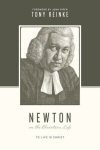
John Newton is famous for his legendary hymn “Amazing Grace.” Many have celebrated his dramatic conversion from a life in the slave trade to his eventual work to end it. But often overlooked are Newton’s forty years as a pastor ministering to parishioners and friends unsettled by the trials, doubts, and fears of life.
Newton is perhaps the greatest pastoral letter writer in the history of the church. He took up his pen day after day to help others fix their eyes on Christ, which, he writes, is the underlying battle of the Christian life. Through a careful study of scores of letters, Tony Reinke brings together Newton’s brilliant vision of the Christian life in one accessible place.
Through Newton’s words and Tony’s words—one voice—God does eye surgery on the heart, so that we see Christ more fully. And more fully means seeing him as more precious. And more precious means more powerful to heal us and change us. Relentlessly focused on the sweetness and the greatness of Christ as the Savior and Satisfier of our souls, over this book flies the banner of John Newton: ‘None but Jesus.’
—John Piper, chancellor, Bethlehem College and Seminary
Here is mastery! As the Lord Jesus Christ, crucified and reigning, was the life-giving focus of the Evangelical Revival, and as George Whitefield was its supreme awakener, and John Wesley its brilliant discipler, so ex–slave trader John Newton was its peerless pastoral counselor and perhaps the greatest Christian letter writer of all time. In his 768 footnote digest of the spiritual wisdom in Newton’s thousand-plus published letters, along with his published sermons and hymns, Reinke distills a vast flow of pure honey for the Christian heart. This is a book to read over and over again.
—J.I. Packer, professor of theology, Regent College
Linger long here. The depths and riches within these pages are truly rare and answer what your soul most hungers for: life in Christ. I will be returning to this book many, many times over.
—Ann Voskamp, author, One Thousand Gifts
Tony Reinke is a staff writer and researcher for desiringGod.org. He is the author of Lit!: A Christian Guide to Reading Books and Newton on the Christian Life.
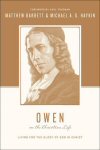
John Owen is widely regarded as one of the most influential English Puritans. As a pastor, he longed to see the glory of Christ take root in people’s lives. As a writer, he continues to encourage us toward discipline and communion with God. His high view of God and deep theological convictions flowed naturally into practical application and a zeal for personal holiness.
In Owen on the Christian Life, Matthew Barrett and Michael Haykin guide us through the seventeenth century theologian’s life and doctrine, giving us a glimpse into the majestic vision that served as the foundation for his approach to the Christian life—the glory of God in Christ.
John Owen is one of the church’s greatest minds. His theology runs deep: it is exegetically robust, expansive in scope, and penetratingly insightful. Barrett and Haykin ably guide readers through Owen’s work and mine many brilliant gems. I highly recommend this book for anyone weary of banal and Christless spirituality.
—J.V. Fesko, academic dean and professor of systematic and historical theology, Westminster Seminary California
The writings of John Owen constitute an entire country of biblical, exegetical, doctrinal, spiritual, casuistical, practical, ecclesiastical, controversial, and political theology. Massive in size, Oweniana cannot be visited on a day trip. Indeed a lifetime hardly suffices for all there is to explore. But hire as your tour guides Matthew Barrett and Michael Haykin, and the daunting journey seems possible after all. With these seasoned scholars and enthusiasts as companions, visiting the varied counties, the significant towns, and the great cities of Oweniana is as enjoyable as it is instructive. Owen on the Christian Life simply excels as an outstanding contribution to an already first-class series.
—Sinclair B. Ferguson, professor of systematic theology, Redeemer Seminary
Theologically rich, carefully researched, and historically grounded, this book leads us into the wisdom of one of the greatest theologians of all time. Barrett and Haykin’s study of John Owen expands our view of the Christian life to embrace the knowledge of God’s glory in Jesus Christ. As our Lord reminded us, that is life indeed (John 17:3). Once you finish this book, you will definitely want to read Owen himself!
—Joel R. Beeke, president, Puritan Reformed Theological Seminary
Matthew Barrett is tutor in systematic theology and church history at Oak Hill Theological College in London, and the founder and executive editor of Credo Magazine (6 issues). He is the author of The Grace of Godliness and Salvation by Grace.
Michael A.G. Haykin is professor of church history and biblical spirituality at the Southern Baptist Theological Seminary and director of the Andrew Fuller Center for Baptist Studies. He has authored or edited more than twenty-five books, including The Christian Lover and the Knowing the Bible Series (12 vols.).
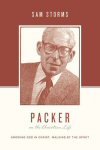
J.I. Packer is widely recognized as a pillar of twentieth century evangelicalism and has had a profound impact on millions of Christians living today. Now in his late eighties, Packer still exerts an enormous influence on pastors and laypeople around the world through his many books, articles, and recorded lectures—works that overflow with spiritual wisdom related to the Christian life. In this soul-stirring book, well-known pastor Sam Storms explores Packer’s legacy and profound insights into prayer, Bible study, the sovereignty of God, the Christian’s fight against sin, and more, offering readers the chance to learn from a true evangelical titan.
The writings of J.I. Packer have been a great help to many believers in many ways. It is therefore most welcome that Sam Storms has synthesized insights from those writings in this helpful, accessible book. I’m sure Pastor Storms agrees that the very best thing about his book would be if it encouraged readers to dive into Packer’s works themselves.
—Mark A. Noll, professor of history, University of Notre Dame
This is one of the best books on J. I. Packer I have read. It gets to the heart of this great theologian’s central concern, what Henry Scougal called ‘the life of God in the soul of man.’ For those of us who have sat at Packer’s feet for many years, this is a delightful reprise and refresher. For new Christians just getting to know Packer, fasten your seat belts!
—Timothy George, dean and professor of divinity, Beeson Divinity School
The most noteworthy feature of this book is the author’s ability to assimilate vast quantities of data, condense it, and put it into a systematic format. This begins with a wonderful biographical chapter and then proceeds to Packer’s theology. A brief version of the systematic theology that Packer has long promised the world, this book is a triumph of scholarship.
—Leland Ryken, professor emeritus of English, Wheaton College
Sam Storms has spent more than four decades in ministry as a pastor, professor, and the author of more than two-dozen books. He was visiting associate professor of theology at Wheaton College from 2000 to 2004, and is currently senior pastor at Bridgeway Church in Oklahoma City, Oklahoma. He is the founder of Enjoying God Ministries and the author of numerous books, including Chosen for Life: The Case for Divine Election, Tough Topics: Biblical Answers to 25 Challenging Questions, and Convergence: Spiritual Journeys of a Charismatic Calvinist.
About the Editors
Stephen J. Nichols is president of Reformation Bible College and chief academic officer of Ligonier Ministries. Previously, he served as research professor of Christianity and culture at Lancaster Bible College. He is the author or editor of several books, including Bonhoeffer on the Christian Life: From the Cross, for the World, The Legacy of Jonathan Edwards: American Religion and the Evangelical Tradition, and contributed to the Basics of the Faith Series (39 vols.).
Justin Taylor (PhD, The Southern Baptist Theological Seminary) is senior vice president and publisher for books at Crossway. He has edited and contributed to several books including A God Entranced Vision of All Things, Beyond the Bounds: Open Theism and the Undermining of Biblical Christianity, and The Supremacy of Christ in a Postmodern World.
Reviews
1 rating

Billy Avery
7/17/2018

Johnnie Ray Bailey
2/24/2016
I have these books in hand a have truly been rewarded for buying them and have earned so much from these that I would recommend you get these through Logos. There are other books in this series that are good.